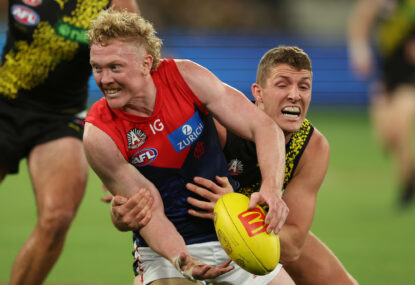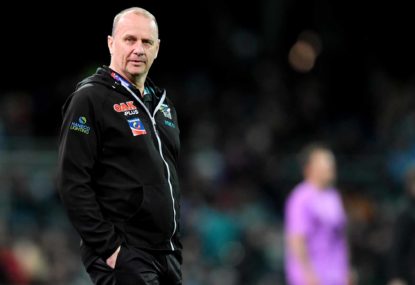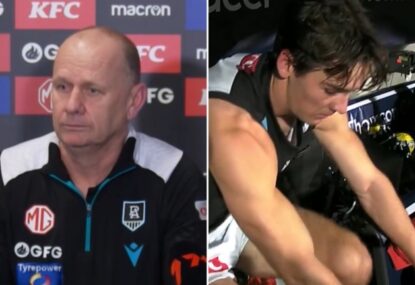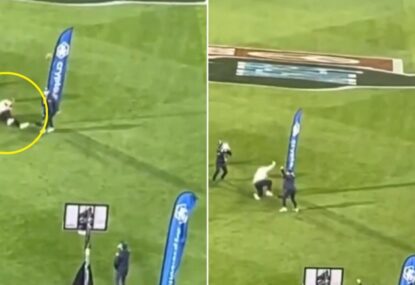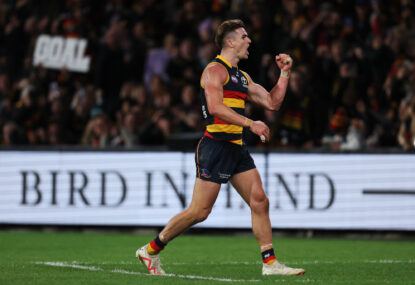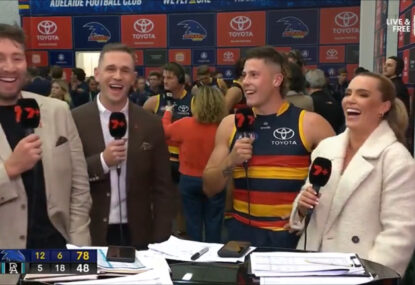A trade can make or break a team’s fortunes. Here’s your club’s best of the 20th century.
Want to see the rest of the series? Click here for Parts 1-3.
Port Adelaide – Jay Schulz (123 games from 2010-2016)
After a frustrating and inconsistent seven-year stint at Tigerland, Schulz was traded to Port Adelaide during the 2009 Trade Period in exchange for small defender Mitch Farmer and Pick 71 (Ben Nason) in the National Draft.
After quickly establishing himself as one of Port’s primary forward targets, Schulz would kick 275 goals (and only 119 behinds) from his 123 games for the Power – averaging 2.24 goals per game for the club. He was widely regarded as one of the most accurate set shots for goal in the competition, with the great Dennis Commetti labelling him ‘deadeye dick’ on numerous occasions during commentary.
Schulz’s most prolific season came in 2014, where he kicked a career-high eight goals against the Western Bulldogs (tying the record previously held by Warren Tredrea for most goals in a single game for the club) and finished second in the Coleman Medal with 66 goals – subsequently earning him a place in the 40-man All-Australian squad.
From 2012 to 2015, Schulz experienced the most fruitful period of his career, kicking at least 40 goals in each of these four seasons, for a combined total of 201 goals. This is without a shadow of a doubt, one of the club’s biggest triumphs at the trade table.
Other Candidates: Utility Brad Ebert was traded from the Eagles alongside pick 45 (Brendon Ah Chee) for Pick 28 (Fraser McInnes) and Pick 49 (on-traded to another club) and played 184 games for Port, in what was another tremendous trade deal for the club. Premiership fullback Darryl Wakelin was traded with Pick 48 (on-traded) in exchange for Pick 4 (Luke Livingston), and was in close contention.
Richmond – Shaun Grigg (171 games from 2011-2018)
After floating in and out of Carlton’s best 22 during his four-year tenure there, Grigg was traded to Punt Road in a straight swap involving Andrew Collins during the 2010 Trade Period. Collins was only able to manage 11 games in the navy blue before being delisted at the end of 2013.
Conversely, Grigg became a reliable and consistent performer for the Tigers, averaging 22 disposals per game whilst playing an array of different positions and roles across his 171 games – famously playing the second ruck role during the club’s 2017 premiership charge despite being just 191cm and 85kg.
At his best, Grigg was renowned for his ability to extract the ball from congestion, provide spread from stoppages, and having efficient disposal by both hand and foot. The former Blue was held within the highest regard at Richmond, mainly for his trademark determination and selflessness.
This selflessness came to the fore when he announced his immediate retirement early in the 2019 season, allowing the Tigers to make a selection in the mid-season rookie draft – WAFL product Marlion Pickett, who would complete a fairytale story by debuting in the Tigers’ 2019 premiership victory.
Other Candidates: Toby Nankervis is a three-time premiership player with the club and has provided great service after coming for the loss of just Pick 46 (Jack Maibaum – who never played a game for Sydney), however injuries and a lack of continuity have seen him narrowly edged out by Grigg as the Tigers’ best trade.
Kane Johnson arrived at the end of 2002 (in exchange for pick 2 and other late-round selections) and was also considered after captaining the club from 2005-2008 and winning the Jack Dyer Medal as best and fairest in 2006.
St Kilda – Fraser Gehrig (145 games and 390 goals from 2001-2008)
The man, the myth, and the legend also known as the AFL’s version of the ‘G-train’ arrived at the Saints during their ground-breaking 2000 Trade Period, with Daniel Sierakowski and Pick 18 (Daniel Kerr) going across to the Eagles.
This trade can be viewed as a win-win, as Kerr went on to become a premiership player with the Eagles and had a pretty decorated career in the west.
After incredibly starting his AFL career as a wingman, Gehrig would develop into one of the most powerful and intimidating key forwards of the modern era, with a permanent move to full-forward in 2003 unlocking his full potential.
Gehrig’s trademarks were his full-chested leads out from the goal square and deceptively quick pace off the mark for someone who currently holds multiple strength testing records at the club.
The big man also formed a potent combination with the likes of Nick Riewoldt and Stephen Milne up forward – helping catapult the Saints back up the AFL ladder. The ‘G-Train’ was nothing short of prolific in front of goal, winning two consecutive Coleman Medals in 2004 (103 goals) and 2005 (74 goals), and currently sits sixth on the club’s all-time goalkicking list.
Gehrig’s other notable achievements whilst at Moorabbin include All-Australian selection in 2004, runner-up in the 2001 best and fairest, and being the club’s leading goalkicker for five successive seasons (2003-2007).
Other Candidates: Current club captain and gun midfielder Jack Steele, traded from GWS in the 2016 Trade Period for the club’s future 2017 second-round draft pick (used to select Brett Daniels), has been enormous for the club and was an extremely unlucky omission.
Sean Dempster and Adam Schneider arrived from Sydney in the same trade deal at the end of 2007, which only cost the club Pick 26 (Brett Meredith).
Barry Hall was traded to Sydney in 2001, with St Kilda using the subsequent picks to draft Nick Dal Santo (pick 13), as well Heath Black (on-traded with pick 17), and Trent Knobel (on-traded with pick 45).
Sydney – Josh P. Kennedy (270 games from 2010-current)
In a similar vein to Hawthorn, a portion of Sydney’s success during the 21st century is due to their success and profitability at the trade table. The well-publicised acquisition of Josh Kennedy is arguably the best of them.
He was traded to the Swans during the 2009 Trade Period (along with small forward Ben McGlynn) for picks 39 (Sam Grimley), 46 (Ben Stratton), and 70 (Matt Suckling).
Although both Stratton and Suckling were premiership players and terrific servants at Hawthorn, Kennedy has been simply immense for the Swans over a long period of time.
He would lead the ‘bloods’ to consecutive finals appearances in his two seasons as the club’s sole captain, before sharing co-captaincy duties with fellow stars Luke Parker and Dane Rampe from 2019 onwards.
Into his 13th season in the Red and White, the midfield warrior has collated quite the impressive CV, which includes three club best and fairest awards (2012,2015,2016) – along with top-three finishes on five separate occasions, three All-Australian jackets (2012,2014,2016), and being an integral part of the club’s 2012 premiership win over his former side, the Hawks.
In an incredible display of consistency and durability, Kennedy has also averaged at least 20 disposals per game in every season since joining the club, having played 270 out of a possible 285 games since 2010. In the twilight of his career, the veteran is also playing a pivotal role in the development of the Swans’ young crop of midfielders coming through, including Oliver Florent and Dylan Stephens.
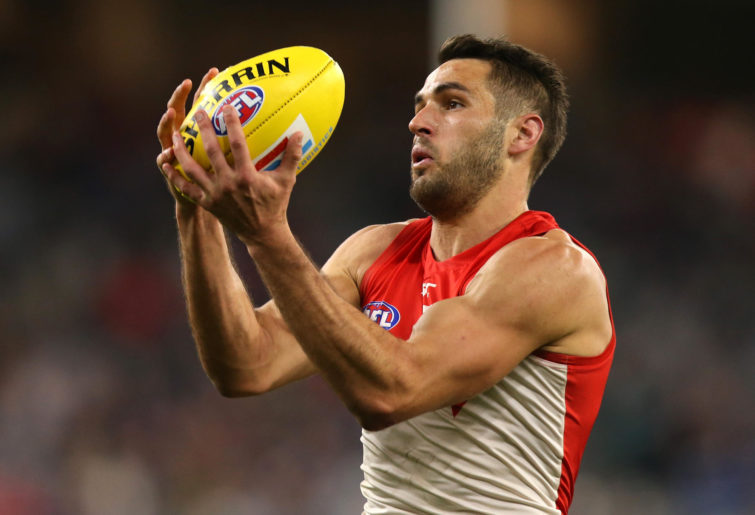
(Photo by Paul Kane/Getty Images)
Other candidates: 2012 Premiership defender Ted Richards played 228 games after arriving from Essendon during the 2005 Trade Period in exchange for Pick 19 (Courtenay Dempsey) and Pick 50 (Sam Lonergan), and provided great stability to the Swans’ defensive unit. As discussed in St Kilda’s ‘other candidates’ section above, Sydney paid a hefty price to get Barry Hall across in 2001, however, he went on to kick 467 goals in 162 matches as well as captain the club to its drought-breaking premiership victory in 2005.
The final instalment of this series will be analysing the best 21st-century trades for both West Coast and Western Bulldogs.































































































